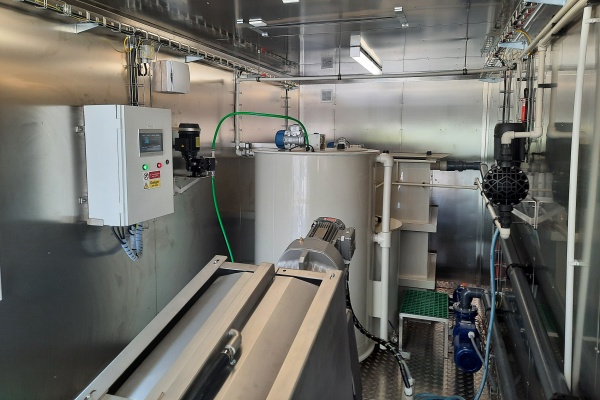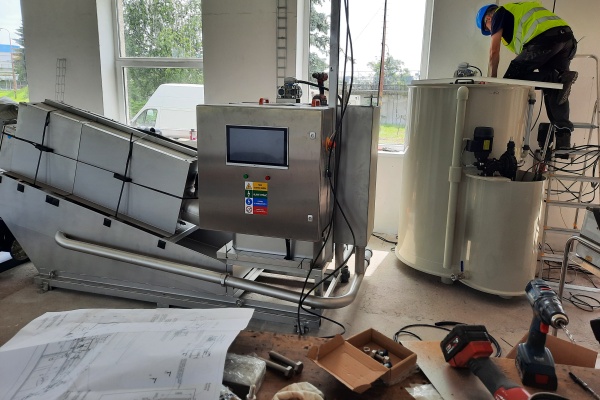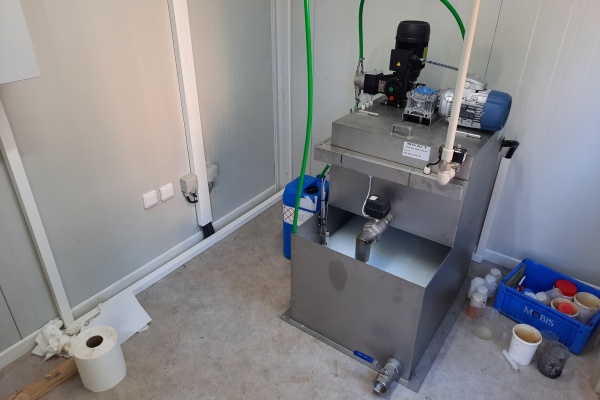The polymer unit is an integral part of the WWTP. Do not underestimate its selection

Before the dewatering presses work on dewatering the sludge at the wastewater treatment plant, the wastewater needs to be thoroughly prepared. This is the time for polymers and polymer units. If you are thinking about a brand-new wastewater treatment plant or want to improve the technology of an existing one, you should also pay attention to them. They can make your operation more efficient as well as save labor. So, what should you look for when choosing them?
What polymers are used for, and why are they needed in wastewater treatment plants?
Sludge dewatering would not be possible if we did not use a flocculant. Polymers are most commonly used as flocculants in wastewater treatment plants. They act like magnets. They bind microscopic solids that float through the sludge. This creates larger units that are easier to separate from the liquid during dewatering. These clumps are called flakes and are between half and one centimeter in diameter.
When the polymer is added to the sludge, the liquid is no longer a homogeneous mud but almost transparent water in which the flakes float. That is, clusters of solid particles. This is crucial for the smooth operation of the dewatering presses. Their job is to separate the water from the solids by gradually compressing them inside the press. The result is a significant reduction in the volume of the WWTP waste. The water is returned to circulation, and the dewatered sludge is much easier to handle.
What should you consider when choosing a polymer unit?

Many factors go into choosing the suitable polymer unit. From the specific type of sludge to the size of the municipality for which the wastewater treatment plant works. It is, therefore, always essential to consult everything sufficiently with experts and technology suppliers.
Frequency of dewatering
Determine how often you will dewater the sludge at your WWTP. There are several scenarios for an average village of about 2000 inhabitants.
If you decide it will be once a month, be prepared to need a larger polymer unit to prepare large quantities. The low frequency of dewatering also means that you will be simultaneously dumping large amounts of chemicals into the WWTP. This can compromise its operation. However, this can be advantageous if you have enough space and an overly busy workforce. They don't have to deal with sludge dewatering as often.
It is ideal for the dewatering process to take place several times a week. This way, the wastewater treatment plant can process the chemicals returned through polymerization. The polymer unit can also be much smaller because it will not simultaneously process such a large amount of polymer. In addition, polymer units already do many of the tasks automatically. This reduces the demands on the operator.
Polymer powder or liquid concentrate?
Even with the choice of polymer supplier, it is important to consult first and foremost with the supplier of the technology of your WWTP. In most cases, however, you will have a choice of powder polymer or liquid concentrate.
Polymer powder is usually cheaper. It has been used in the field for a long time, and many people are more used to it. However, it does have its drawbacks. Storing it in humid environments is complicated. It takes about an hour to prepare it for use. The polymer unit thus needs a larger tank. If you plan the amount of polymer incorrectly, the unused chemical can no longer be stored because it degrades quickly.
Liquid polymer concentrate is about 20% more expensive. However, it is not a significant factor in the overall cost of running a wastewater treatment plant. Its preparation is faster. It takes about 10 minutes. It is easier and safer to handle for the WWTP operator. Polymer units that work with liquid concentrates are cheaper than those that use powdered polymer.
What types of polymer units can you choose from?
Choosing the suitable polymer unit and its capacity depends mainly on the amount of sludge you need to process regularly and on the other technologies for which the flocculant is being prepared.
Manual polymer units are entirely dependent on the work of the operator. The operator fills the tank with clean water, adds the appropriate amount of liquid concentrate or powder, and manually starts the electric blower. However, it is significantly cheaper. It is, therefore, suitable for smaller municipalities up to about 1500 inhabitants.
Automatic polymer units have their own control system and consist of two tanks. When the polymer mixture in the tank, which is the source of flocculant for the dewatering machine, runs out, it automatically prepares the polymer in the mixing tank and refills the mixture. The higher purchase price is balanced by the minimal requirements on the operators, who only have to make occasional checks.

Continuous automatic polymer units are suitable for operations with a consistently high demand for flocculant. They are helpful where wastewater treatment plants consume large quantities of polymer. This means especially in large cities.
And our recommendation?
When selecting a dewatering machine and its corresponding polymer unit, please base your choice primarily on the sludge production calculations for your municipality. Make a sufficient reserve for its development and then reach for the smallest plant that can still process it.
The reserve is vital so that you do not have to change the technology after a few years due to population growth. Again, the smaller the drainage machine, the lower the regular maintenance requirements and the more accessible the service will be.
Last but not least, think about the operator. Ideally, the dewatering process should be handled during a typical day shift.
Are you choosing a dewatering machine or need advice on sludge polymerization? Contact us, and we will be happy to discuss the various solutions with you.


